![]()
Our first 500 board reviews have involved the responses of 3,621 directors. Whilst we encourage boards to involve their executives in their board reviews only director responses were used for the purpose of this research paper.
The big question is, have boards improved since October 2020 compared to the period prior or are they worse? And if so, in what areas have they improved and what are they worse at?
Boards have improved slightly overall
Readers will be pleased to know that boards have improved overall over the last few years compared with the period prior, albeit not by a significant amount.
The survey items in our 500 board surveys were responded to on 7-point agreement scale where 1 = strongly disagree through to 7 = strongly agree. The average response improved by 0.21 when comparing the second 250 with the first 250.
In the last few years there has been significant increase in regulations, focus on corporate governance and the rise in community expectations, along with Royal Commissions and some spectacular corporate failures. In this context it is disappointing that governance and board effectiveness had not improved by more over this period.
The more important question for your board is of course, not whether other boards have improved or are worse, but whether your board has improved?
We encourage boards to find out the answer to that important question in an objective way including to find out the areas with the greatest potential for improvement. It is only then that they can develop an evidence-based plan to improve.
The main areas of improvement
We explained how we identified the 20 most important areas of a board’s effectiveness as in the article on page 6. This enables us to categorically identify the areas of greatest improvement by boards post October 2020 compared with the period prior. Because each of the 20 factors comprise a number of relevant survey statements, we can also identify the greatest contributors to the improvement in each area as shown below.
The good news is that boards have improved their oversight of executive remuneration, have improved board/CEO relationships and performance management of the board with the main contributing factors for each being as follows:
• Executive remuneration – the biggest contribution to this improvement was boards ensuring that the CEO’s pay is appropriate with an improvement in average response by 0.62.
• Board/CEO relationship – the biggest contribution to this improvement was ensuring that the CEO’s performance was managed well on behalf of the board with an improvement in average response
by 0.64.
• Performance management of the board – the biggest contribution to this improvement was the more regular review of the effectiveness of individual directors with an improvement in average response by 0.62.
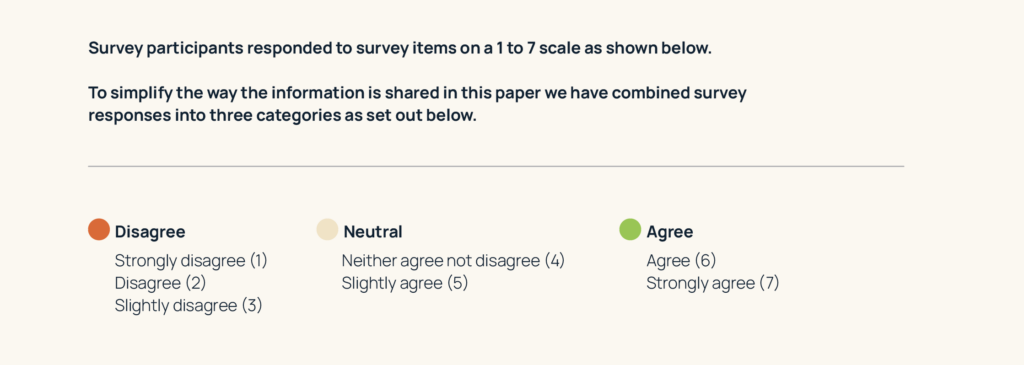
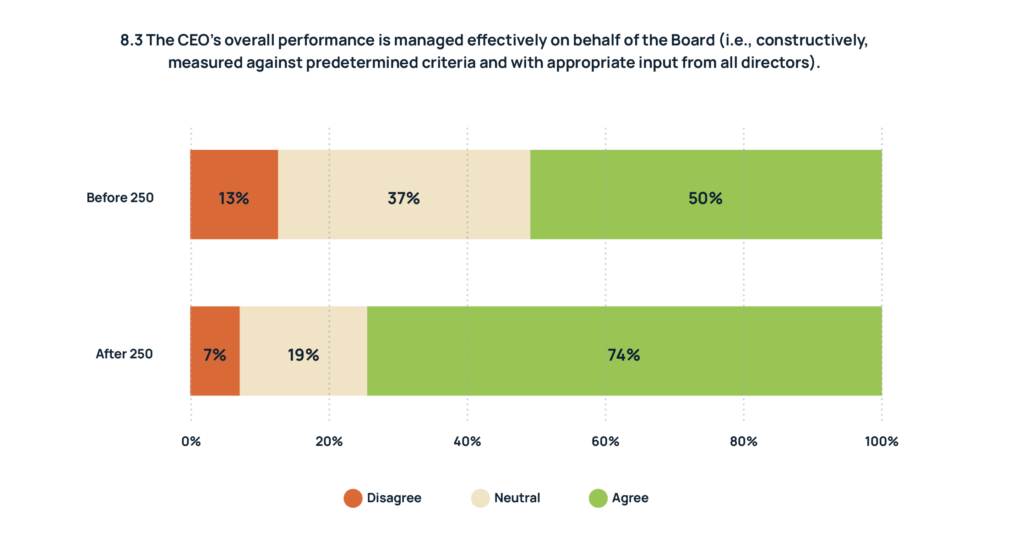
Little or no change
Disappointingly, the areas of little or no improvement were
• Organisation culture and integrity – there has been a greater focus on culture by regulators and others in recent years. Accordingly, it is surprising that boards have not improved at taking an appropriate role in shaping the organisation’s culture with a slight decline in average response by -0.09.
• Board priorities – great boards carve out time to deep dive into the most important matters. As regulatory and other demands increase focusing on the most important matters becomes even more important. But boards haven’t improved at this with the average response declining slightly by 0.12.
• Board/management relationships – good board/management relationships are foundational to a board’s performance and effectiveness. Unfortunately, the board’s working relationship with management was one of the few survey items that declined with a decline in average response by -0.23 albeit from quite a high base.
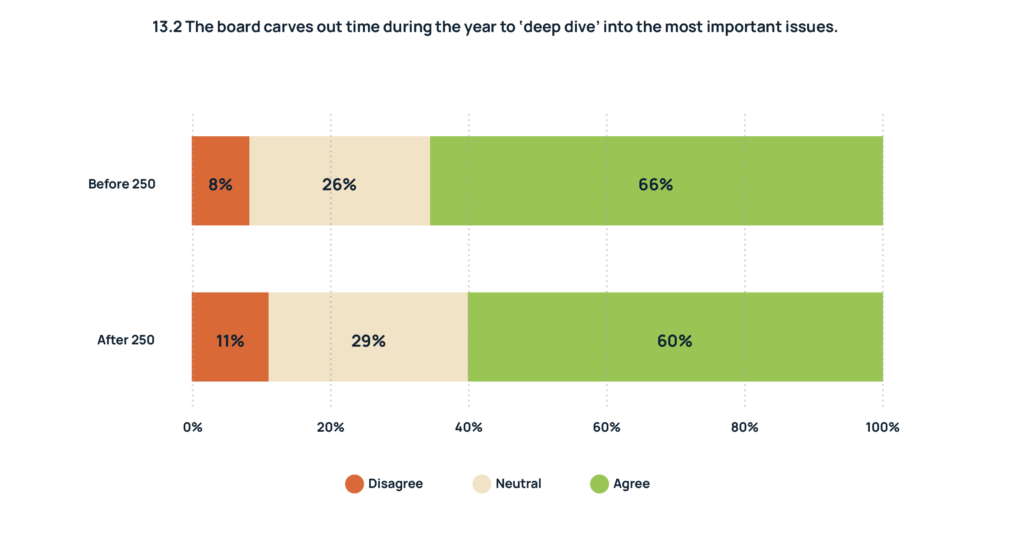
Little or no change
Disappointingly, the areas of little or no improvement were
• Organisation culture and integrity – there has been a greater focus on culture by regulators and others in recent years. Accordingly, it is surprising that boards have not improved at taking an appropriate role in shaping the organisation’s culture with a slight decline in average response by -0.09.
• Board priorities – great boards carve out time to deep dive into the most important matters. As regulatory and other demands increase focusing on the most important matters becomes even more important. But boards haven’t improved at this with the average response declining slightly by 0.12.
• Board/management relationships – good board/management relationships are foundational to a board’s performance and effectiveness. Unfortunately, the board’s working relationship with management was one of the few survey items that declined with a decline in average response by -0.23 albeit from quite a high base.
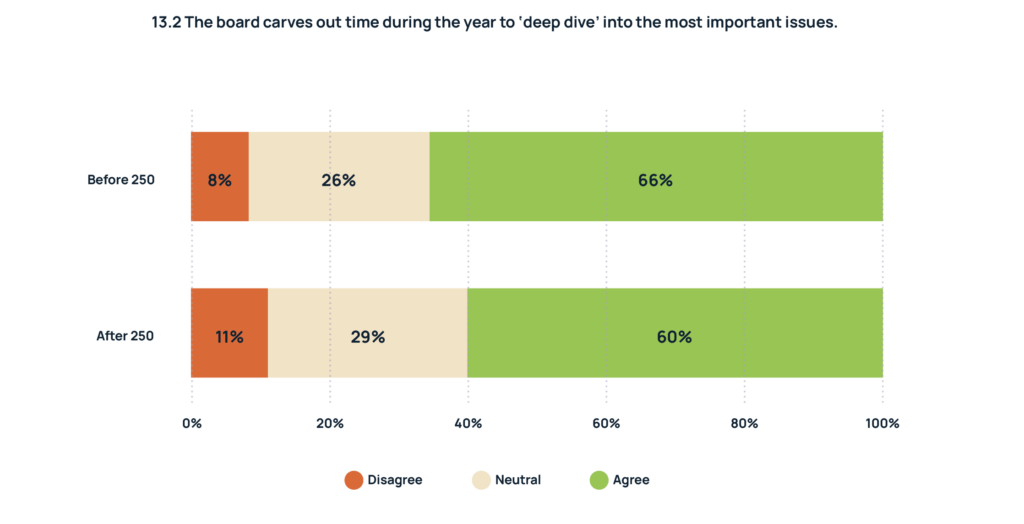
Other good news
The chair plays a very important role in the current and future success of the board. And you won’t find an effective board that doesn’t have an effective chair.
Pleasingly, the chair’s effectiveness continues to be rated very high by their fellow directors. It is also rated as one of the highest survey items which is good news too.
This is where benchmarking is important. If you don’t use benchmarking and you get what appears to be a pretty good average director response for your chair’s effectiveness, you may have a bottom quartile chair without even knowing it.
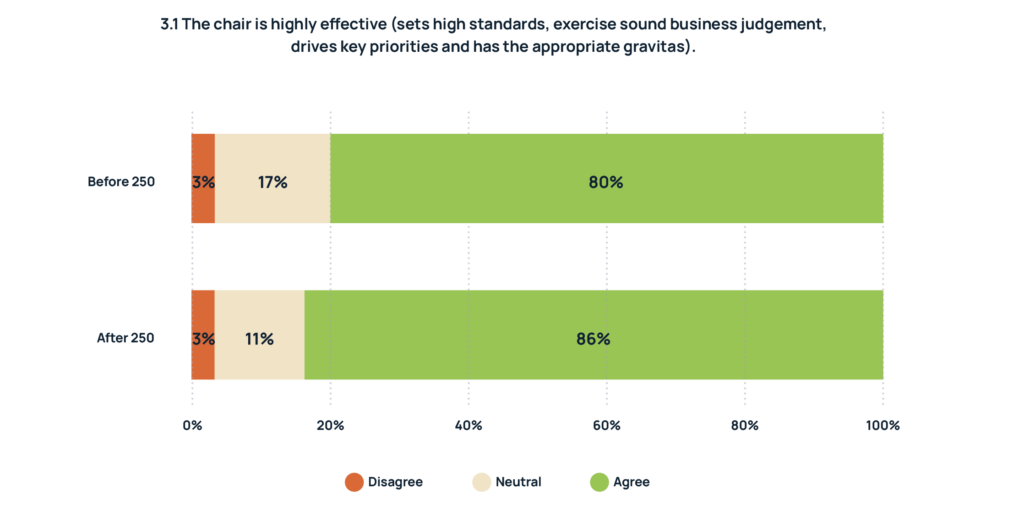
Other bad news
With all the focus on diversity and the significant benefits for better decision making and improved productivity, innovation and performance too many directors still think that their boards are lagging in this area.
With board’s holding the power to deal with this issue why don’t they? In our experience one reason they don’t is that many ineffective boards fail to take a broad minded and innovative approach to sourcing new directors. Instead, they continue to just rely on who they know and fish from a very small pond.
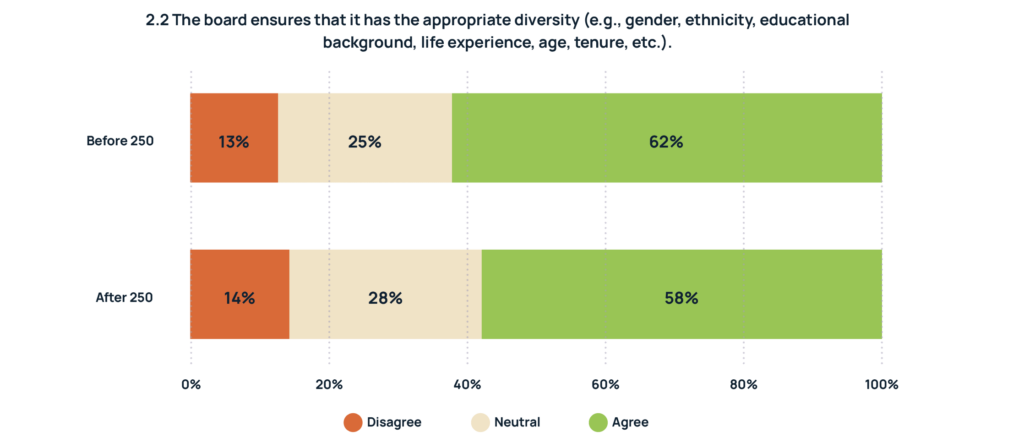
Profit versus not-for-profit
For-profit organisations were found to out-perform not-for-profits in the following areas indicating that nor-for-profits have the opportunity to add focus in some or all of these areas:
• Talent – Taking an active role in overseeing the growth of the organisation’s leadership talent pool
• Remuneration – Ensures the remuneration packages of Management other than the CEO are appropriate
• Performance Management – Ensures the organisation has an effective performance management system with agreed accountabilities
• Innovation – Directors keep abreast of new developments and innovations through study and training.
Not-for-profits did not outperform for-profit organisations in a measurable way in any areas.
Conclusion
Boards need to improve faster if they are to keep up with the new governance demands and the increase in community expectations.
The more important question for your board is, however, not whether other boards have improved or are worse, but whether your board has improved? Please don’t let the side down. Start taking steps to measure and improve your board’s performance and effectiveness today!


